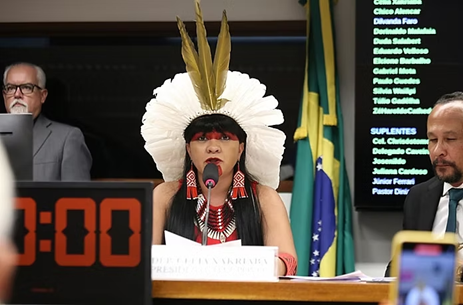
Several political sectors from the center and right—primarily aligned with agribusiness, and mining interests—pushed through the approval of Bill 2.159/2021 in the Brazilian Federal Congress during the early hours of Thursday, July 17, 2025. The bill passed by a vote of 267 to 116 and is being condemned by more than 350 Indigenous and civil society organizations as the most significant environmental setback in Brazil since at least the 1980s.
One of our most urgent concerns is the security and protection of Indigenous Peoples in voluntary isolation or in initial contact (PIACI). Weakening protections for natural reserves and demarcated Indigenous territories could have devastating consequences for dozens of groups - many of whom remain largely unknown to the outside world. Several solid studies have identified evidence of more than 80 distinct PIACI groups in the Brazilian Amazon, some in constant mobilization across borders, because they do not know borders. Any unauthorised contact with them poses serious risks of transmitting diseases to which they have no immunity, potentially resulting in genocide or the decimation of entire peoples or groups who have lived in those lands for centuries.
The bill's core dismantles the current framework of environmental licensing, opening the door to widespread deregulation and weakening of environmental safeguards, especially those linked to demarcated Indigenous lands.
Cultural Survival urgently calls on the Brazilian president to veto this bill, known in the country as PL da Devastacao—the Devastating Bill.
There are five major implications of the bill for Indigenous Peoples:
1. Cancelling of Protection of Territories in the Due Recognition Process of Demarcation
The bill institutionalizes the denial of ongoing territorial rights by excluding unapproved Indigenous and Quilombola lands from licensing processes. This directly affects approximately 32% of Indigenous lands and 80% of Quilombola territories with open processes, legalizing the invisibility of territories that already have traditional occupation and are protected by the Constitution.
2. Undermining the Right to Traditional Land and Depletion of the Right to Consultation and Free, Prior and Informed Consent (FPIC)
With self-licensing (LAC) and the waiver of analysis by agencies such as FUNAI and ICMBio, projects with indirect socio-environmental impacts will be able to move forward without the Free, Prior, and Informed Consent of the affected communities, violating ILO Convention 169 and the right to self-determination of Indigenous Peoples. It also undermines the Indigenous Peoples` right to their lands, territories, and resources, which includes the right to own, use, develop, and control them, according to the United Nations Declaration on the Rights of Indigenous Peoples (UNDRIP). Additionally, UNDRIP emphasizes the right to self-determination, which includes the right to autonomy and self-government in matters relating to their internal and local affairs. Brazil has not only adopted UNDRIP as its guiding framework but is also signatory to ILO Convention 169.
3. Facilitating Land Invasion and Land Grabbing
The lack of licensing requirements for certain activities, such as agriculture and infrastructure, can be used as a gateway for land grabbing on Indigenous lands and the illegal conversion of protected territories. Without binding environmental conditions, predatory occupation will be encouraged. It also represents a massive setback in terms of preventing river contamination and deforestation, which is essential to safeguarding health, food, and policies for Indigenous Peoples' health and territorial security.
4. Shielding Companies from Liability
The exemption from conditions and automatic renewal of licenses, even in cases of non-compliance, reduces corporate accountability, discourages damage repair, and compromises the due diligence standards required by international investors and regulators, such as those of the Organisation for Economic Co-operation and Development (OECD), supported by Brazil, and the European Union. In times when corporate responsibility must be elevated to its highest level, shielding them from liability represents a catastrophe.
5. Weakening Indigenous Advocacy and Climate Governance
By transferring decisions to local levels without technical infrastructure or social oversight, the bill weakens the ability of Indigenous and environmental organizations to monitor, participate in, and influence the process. Indigenous advocacy is based on UNDRIP, ILO Convention 169, and their right to self-determination. The Bill jeopardizes Brazil's international commitments (such as the Paris Agreement, the Global Biodiversity Framework, UNDRIP) and discredits its leadership at the UNFCCC COP30.
The bill also threatens the goals of COP 30. In the very year that Brazil is set to host COP30—the United Nations Climate Change Conference—with Indigenous rights and climate justice at the heart of the global agenda, this bill sends a contradictory and alarming signal. Instead of reinforcing the country’s environmental leadership, it dismantles critical protections, undermines Indigenous territorial rights, and weakens Brazil’s credibility on the international stage.
In the very year that Brazil is set to host COP30—the United Nations Climate Change Conference—with Indigenous rights and climate justice at the heart of the global agenda, this bill sends a contradictory and alarming signal. Instead of reinforcing the country’s environmental leadership, it dismantles critical protections, undermines Indigenous territorial rights, and weakens Brazil’s credibility on the international stage.
Cultural Survival urges President Lula to veto Bill 2.159/2021 and expresses its full support for Indigenous Peoples, environmental agencies, and civil society partners working to defend the long-term protection of Indigenous communities and the ecosystems on which they depend.
Top photo: Indigenous leader Celia Xacriaba speaking at the Federal Congress/2024. Photo courtesy of https://www.celiaxakriaba.com/me-conhe%C3%A7a.

